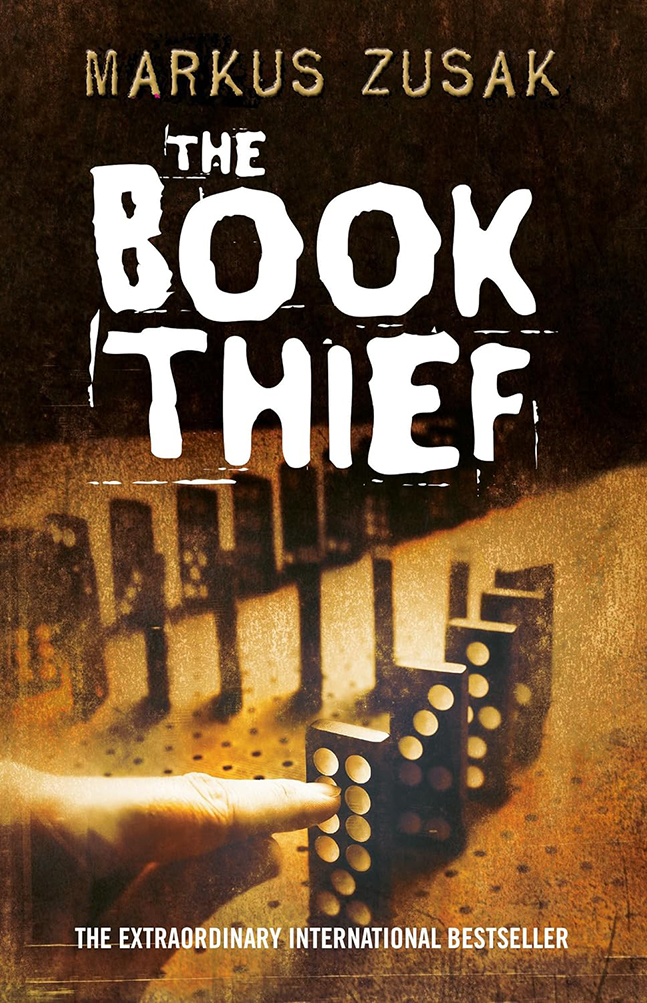Mesmerizing. Poignant. Unforgettable. “The Book Thief” is a literary gem that transports readers to Nazi Germany, immersing them in the tale of Leisel, a young girl navigating the complexities of life amidst the turmoil of war. Narrated by death itself, Markus Zusak crafts a hauntingly beautiful narrative that delves deep into the human experience, capturing both the darkness of war and the resilience of the human spirit.
The perspective of this book is what intrigues me. The idea that German citizens too were victims of Nazis creeps up on you softly and subtly at the beginning and then ever so obviously as the story progresses. It is not what one expects of a WWII narrative. No one expects the misunderstood tremors of a young German girl. No one expects the yearning of a mother when her son is sent to be molded into a brainwashed soldier: born to die. No one expects the rift caused between families due to varying political ideals. A father and son estranged, amiability floundering off in the midst of war. The normalcy of the setting is established through the eyes of a child, and the mundaneness allows this idea to be lost in translation. A blurry and undermined phenomenon. Until it isn’t.

Zusak’s choice of death as the narrator is a stroke of brilliance. There is something ever so poetic about how death views life, how death can have remorse, carrying the souls of children in its arms. This narration also transcends one’s stereotypical views about death’s perception of the world. For example, through death’s eyes, war is dedicated as a demanding boss rather than a friend. This unconventional narrative device adds layers of depth to the story, inviting readers to ponder life, death, and the meaning of existence.
With death’s perception of the world comes breathtaking imagery. It speaks of how the sky’s color contorts and distorts as each individual takes their last breath. How each color is never the same, as each human is never the same. There are lines that make the scene so alive to a point where it is heart thumping and sets one’s soul aflame. There are lines which make the scene so bleak that there is nothing but silence echoing in the gray confines of one’s mind. To achieve that beautiful juxtaposition, I believe, is the true sign of mastery over words.
Yet, without a doubt my favorite element of the book is the characterisation and the relationships that are forged. The characters in “The Book Thief” are impeccably drawn, each one bursting with humanity and complexity. There are simple motifs that are carried across the pages with each character.
Take the dynamic between Rudy and Leisel, where the motif of him playfully asking her to kiss her while she refuses is prevalent. This recurring dialogue makes it even more painful when he passes away and she kisses him for the first and last time.
Take Hans, with his beloved accordion and nurturing actions. His character was built up meticulously through what he did: the way he supported Leisel through her nightmares, his gruff but loving demeanor. Hans was a foil to the rest of the Nazis. A kind man who gave bread to mistreated Jews and painted off the anti-semitic slurs on windows. A risky man who provided Max, a Jewish man with shelter.
And finally, let us evaluate Leisel herself, our protagonist. She is defined by her resilience and compassion. Liesel’s life is marked by trauma and loss, yet she finds solace in the power of words and literature. Her passion for reading begins when she steals a book at her brother’s graveside, and it becomes a means of coping with the harsh realities around her. Liesel’s character is defined by her courage, empathy, and the deep bonds she forms with those around her. Through her eyes, the narrative explores the impact of war, the importance of human connection, and the enduring power of stories.
What sets “The Book Thief” apart is its ability to balance moments of heartache with moments of joy. Despite the darkness that pervades the story, there are moments of light and hope that shine through, reminding readers of the resilience of the human spirit. The bond between Leisel and Max, the Jewish man hidden in her basement, is particularly moving, showcasing the power of love and friendship in the face of adversity.
As the story unfolds, Zusak builds to a climax that leaves a lasting impact. The deaths of beloved characters are rendered with such grace that they feel like a gut punch to the reader’s soul. What I appreciate is that the relationships Liesel builds make the characters’ deaths even more heartbreaking. Even though we’re warned about their fates, the way it’s written is so haunting that it brings genuine tears. It captures that flood of memories, love, and regrets that rush through your mind when someone dies.
“The Book Thief” is a masterpiece of storytelling, a testament to the power of literature to illuminate the darkest corners of the human experience. Markus Zusak’s unforgettable tale will stay with readers long after they turn the final page, a haunting reminder of the indomitable spirit of humanity in the face of unimaginable hardship.